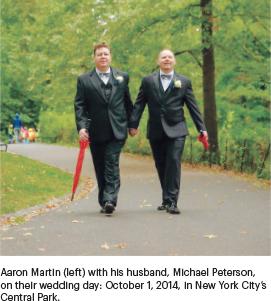About 5 years ago, I began experiencing some digestive issues that I initially blamed on the stress from coping with my mother’s diagnosis of Alzheimer’s disease. But after 2 weeks of unrelenting symptoms, including abdominal pain, a change in my bowel habits, and rectal bleeding, I saw my primary care physician. Since I was about to turn 51, he ordered a colonoscopy, and my life was soon thrown into turmoil.

The procedure found two large tumors below the midpoint of the descending colon, necessitating neoadjuvant chemotherapy and radiation therapy to shrink them before they could be removed surgically. My surgical oncologist explained that the potential short- and long-term side effects of the surgery would largely depend on the location of the tumors, the stage of cancer, and the extent of surgery needed to remove all traces of malignancy. If it was possible to do a low anterior resection, in which a reversible ileostomy is made and the colon is reattached to the remaining rectum, my normal bowel movements—and presumably my sexual health—would return to normal, he said. However, if my rectum was removed—a proctectomy—and I had a permanent colostomy fitted with an ostomy pouching system, both normal bowel movements and a return to sexual function were doomed. I was overwhelmed by the potential repercussions of the surgery. Maybe I was in denial, but I didn’t seriously consider the worst-case scenario the surgeon presented.
I am part of a gay couple, and sexuality is so integral to our lives. I couldn’t fathom that it was possible to lose this essential expression of our love and my psychological and physical well-being.
Living With the Consequences of Cancer
The first question I asked after I awoke from surgery was whether the colostomy was temporary or permanent. I was devastated to learn that it was permanent. And despite attempts to treat my subsequent erectile dysfunction with medication, I have not been able to resume sexual relations with my husband, Michael.
What has been completely frustrating is that no one on my medical team, including my oncologist, radiologist, and surgical oncologist, has been able to offer any suggestions on how to restore some semblance of sexual health, including a simple referral to a sexual health therapist. In conversations with my physicians about my sexual dysfunction, I felt like the topic was a hot potato that none of them wanted to tackle.
Before I had surgery, I remember my surgeon telling me that one of the problems I might experience afterward is retrograde ejaculation, rendering me infertile.
“Do you want to have kids?” the surgeon asked Michael and me during one of our consultations. When we answered “no,” he said, “then, it’s not a problem.” I was so focused on the surgery and the possibility of a permanent colostomy that I wasn’t thinking beyond to the probable loss of my sexuality. When I questioned the surgeon after the operation about my sexual dysfunction, he said I knew this was a risk of the treatment.
Preparing Patients for Life-Changing Events From Cancer
Let me be clear. I’m not suggesting that any of my physicians did anything wrong or were negligent in my care. I know they all did the best they could, and it looks like their efforts have led to a cure. I am coming up on the 5-year anniversary of my colorectal cancer treatment and remain cancer-free, and I am grateful.
However, although my life has been spared, the quality of that life is gone, perhaps forever. I understand that treatment for cancer is not an exact science, and it’s difficult for oncologists to know exactly how cancer and its treatment will impact a patient’s life, long term, but I feel that more could have been done to adequately prepare me for what has happened. At the very least, I should have been offered referrals to sexual health specialists and support groups, so I could have gotten help sooner.
Grieving the Loss of Sexual Intimacy
A few years after the surgery, I was housesitting for my sister and her husband; I became so depressed about my situation that I called the suicide hotline. I don’t think I was seriously considering taking my own life, but the thought frightened me enough to seek counseling with a sexual health therapist.
“I’m fortunate to be in a loving relationship, and we are determined that not even cancer will pull us apart.”— Aaron Martin
Tweet this quote
At this point, Michael and I have a completely nonsexual relationship, and we are working with the therapist to find other ways of communicating intimacy. Still, one of life’s great joys has been taken from us.
I’m fortunate to be in a loving relationship, and we are determined that not even cancer will pull us apart. We are continuing to adjust to our situation, and our day-to-day life is fine. But the sadness over the loss of our sexual life never really goes away. We are still learning how to live with that sorrow.
Mr. Martin, a financial advisor, lives in Kansas City, Missouri.
Editor’s Note: Columns in the Patient’s Corner are based solely on information The ASCO Post received from patients and should be considered anecdotal.

